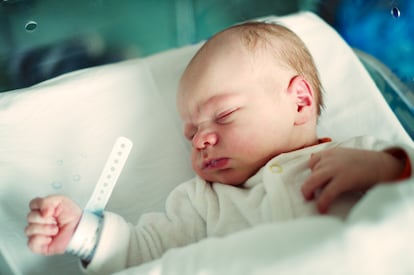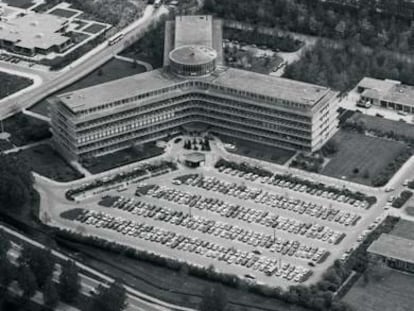A third Dutch gynecologist is found to have used his own semen for fertility treatments
Jos Beek fathered at least 21 children from 1973 to 1986 even though his patients thought the donor was anonymous. Two other similar cases have emerged in recent years


A Dutch gynecologist who worked for 25 years at a regional hospital in the Netherlands used his own semen for fertility treatments and fathered at least 21 children, according to statements made on Tuesday by Alrijne Hospital, located around 40 minutes from Amsterdam in Leiderdorp. The doctor’s name was Jos Beek and his “unacceptable acts” took place between 1973 and 1986.
This is the third such case to have emerged in the Netherlands since courts authorized DNA tests in 2017. In 2019 news broke that a fertility doctor named Jan Karbaat had conceived at least 49 children, and possibly as many as 80. And last year another specialist in artificial insemination, Jan Wildschut, was found to be the biological father of at least 34 babies.
All three practitioners, who have since passed away, had told their patients that the donors would be anonymous. Beek died in 2019.
The hospital said that Beek’s acts were “unacceptable” and indicated that in June 2021, an organization named Fiom, which provides assistance with unwanted pregnancies and paternity issues, found DNA matches between one of Beek’s acknowledged sons and 21 children born to Beek’s patients at the clinic. The mothers had been told that the donor would be anonymous, “and we are worried about their emotional state given the shock all this represents,” said hospital administrators.
It is unclear how many women underwent fertility treatments overall because the patient files were destroyed, but the hospital is not ruling out the possibility of discovering “dozens of descendants of the gynecologist Beek.” An independent investigation has been launched and the results are expected in the summer of 2022.

In the 1970s, fertility treatments were a new option in the Netherlands and it would be another 20 years before a national protocol was introduced. “There were few rules and a lot less visibility than there is today, since we now have audits, and that may have played a role,” said Peter Jue, a hospital administrator at Alrijne in a statement to the Dutch media.
In 2004 semen donors ceased being anonymous. Instead, clinics are under obligation to provide information about them to a foundation that keeps a national database. People born through fertility treatments can start looking for their biological parents from age 16. Although there is a limit of 25 donations per person, there have been cases of donors who far surpassed that figure by going to different clinics in violation of the rules. In 2017 it emerged that one single donor had been to 11 centers and had fathered at least 102 children.
Also in 2017, a gynecologist named Jan Karbaat, who had a fertility clinic in Rotterdam, was found to have used his own semen to inseminate many of his patients. He sometimes also used samples from different donors on patients seeking more than one pregnancy, instead of using semen from the same donor as the women had asked. Other times he failed to check the semen for hereditary diseases that later emerged in the children.
The third doctor, Jan Wildschut, used to work in Zwolle, in the northeast of the country. Between 1981 and 1993 he often used his own semen on his patients, and the children found out when they sought out their biological fathers.
Tu suscripción se está usando en otro dispositivo
¿Quieres añadir otro usuario a tu suscripción?
Si continúas leyendo en este dispositivo, no se podrá leer en el otro.
FlechaTu suscripción se está usando en otro dispositivo y solo puedes acceder a EL PAÍS desde un dispositivo a la vez.
Si quieres compartir tu cuenta, cambia tu suscripción a la modalidad Premium, así podrás añadir otro usuario. Cada uno accederá con su propia cuenta de email, lo que os permitirá personalizar vuestra experiencia en EL PAÍS.
¿Tienes una suscripción de empresa? Accede aquí para contratar más cuentas.
En el caso de no saber quién está usando tu cuenta, te recomendamos cambiar tu contraseña aquí.
Si decides continuar compartiendo tu cuenta, este mensaje se mostrará en tu dispositivo y en el de la otra persona que está usando tu cuenta de forma indefinida, afectando a tu experiencia de lectura. Puedes consultar aquí los términos y condiciones de la suscripción digital.








































